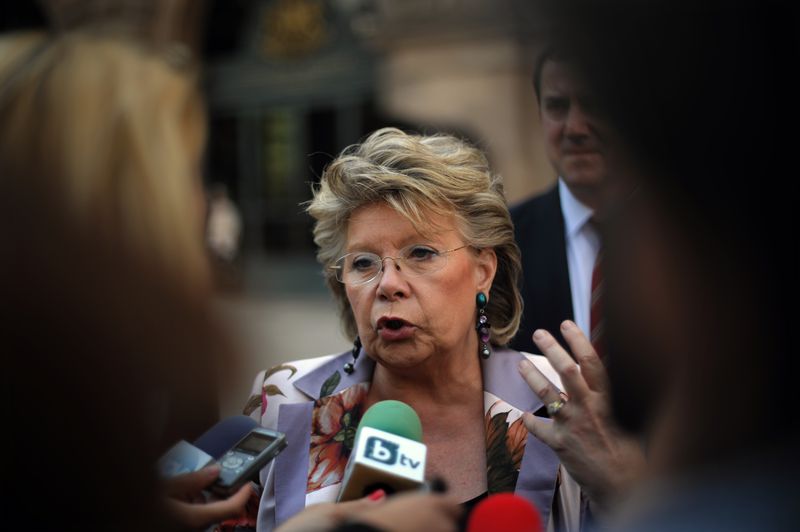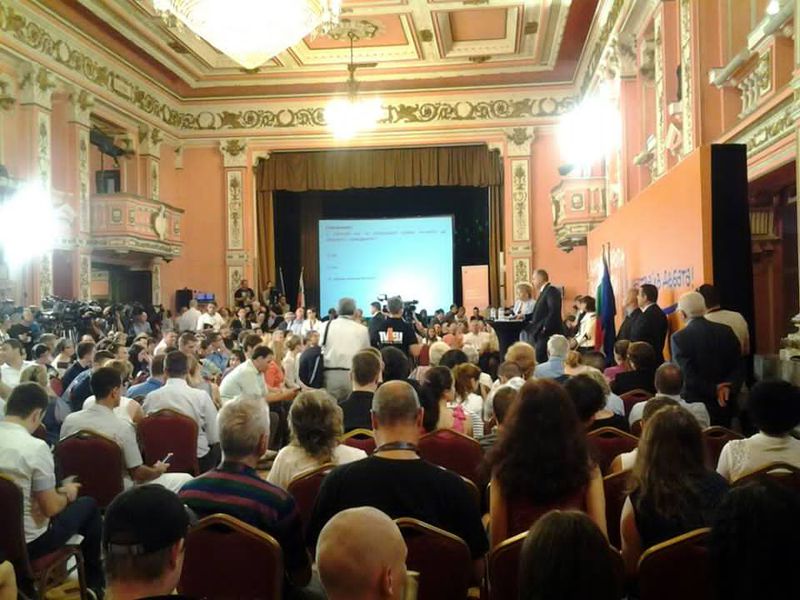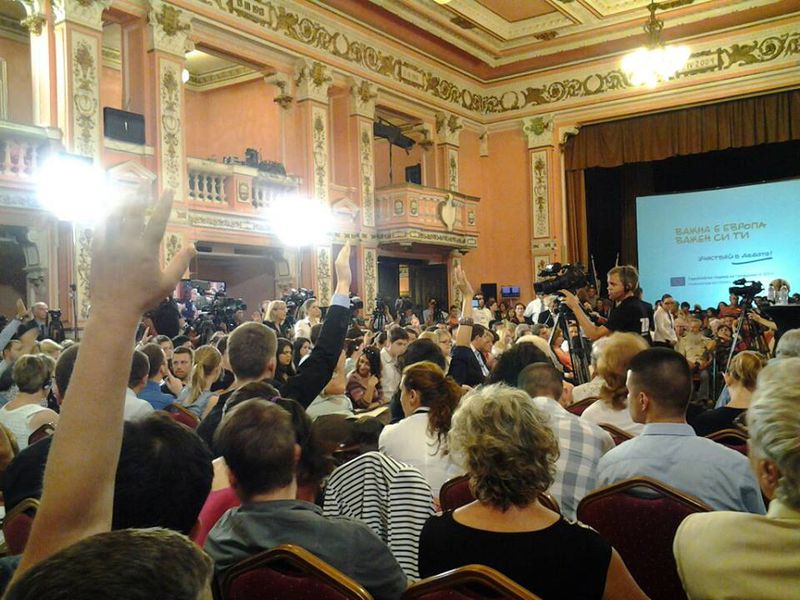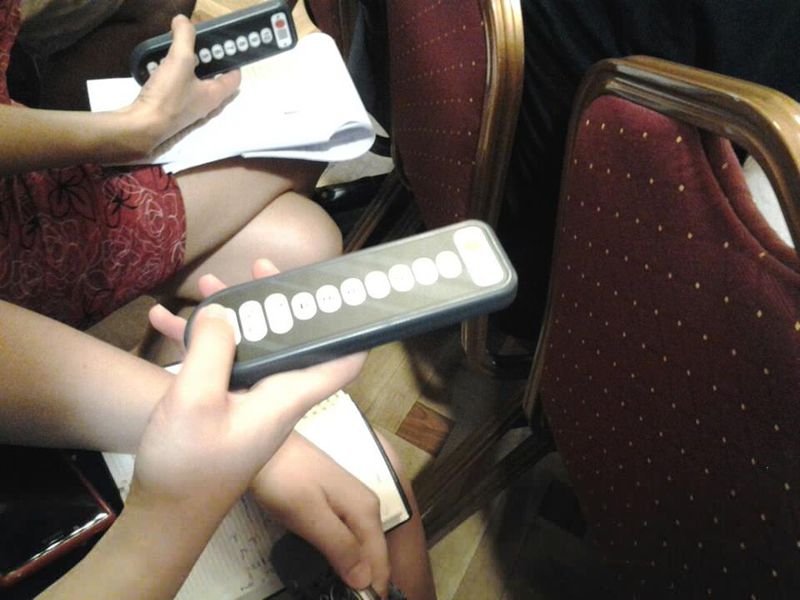A Complete Failure of the Citizens' Dialogue with Viviane Reding in Bulgaria
Adelina Marini, July 23, 2013
A striking gap between what the Bulgarian citizens wanted to tell European Commission Vice President Viviane Reding and what she wanted to hear from them. One of the reasons is more complex and we can discuss till the end of time who is to blame because there is a complete absence of a real dialogue on specific issues with the citizens in Bulgaria who are called upon to "tell" their opinion during elections only and after that they are forced to wait for the results of their choice. Media, too, proved to be deaf and incapable to play their fundamental role of a conductor between the people's problems and those who are elected to solve them. The second reason, however, is purely of life - an absolute organisational impotence.

The citizens' dialogue with Viviane Reding is an initiative aimed at collecting the views of people from all member states, as well as their politicians, about in what direction should the Union go, should there be more or less Europe, should there be a political union or should we leave it to simply be a single market - all these questions are essential at this precise moment for Europe and are being discussed very actively in many of the EU member states. Issues that concern all of us in the long-term. Bulgaria, however, is among those who are completely absorbed with their domestic problems, highly incapable of solving them and entirely alien to the developments in Europe, beyond the desire someone to come from there and do our work because with these politicians of ours this is impossible.
It is precisely because of the nature of the debate that the European Commission representation in Sofia organises the debate being responsible for the distribution of the topics, for the registration of participants, to find the best possible host of the discussion, to communicate this initiative through media and in general for every detail that, when the organisation is good, remains unnoticed, but when the organisation is bad or absent, the tiniest detail is capable to ruin the effect, like for instance not working for many minutes microphones in the hall. The technical organisation on the one hand is a very simple thing, but it requires an attitude toward professionalism. It was hardly a problem to make the necessary technical checks that all technical devices in the room work to ensure that they will not be a source of tension and will not lose the precious time of the participants, especially of the Commissioner who has a plane to catch, passing through the chaotic Sofia traffic, additionally complicated by protesters.

That is why the technical support for the debates is essential and does not require additional funds than the already planned. It simply requires professional attitude and double checks - something really European - checking until it is perfect.
The second pillar of good organisation is ensuring a good host. His role is central because he is responsible for the management of time, of the audience, of the topics, and of everything that is taking place in the hall. He must be completely aware what is his task, which is really simple. The debate will be webcast live not only in Bulgaria. It will be webcast via the European Audiovisual Service which means that it will be watched by many people outside Bulgaria for whom the lack of working microphones will be a problem because they will be deprived of translation. Secondly, these people should be able to recognise common issues and if someone talks to them about Belene or Peevski, there must be a way to tell them who these are and why are they so important for Bulgaria.
The moderator of the debate must also be aware of the huge significance the European Commission grants to the social networks, by putting them at equal footing with all the other forms of communication. That is why the apology "No time was left for the questions from Twitter" is a slap not for the host, but for the Commission which has failed in listening to the opinion of the Twitter-people, as my colleague Alexander Boychev described them. The people who manage well the audience (that is not only those people who are physically there) actually work not for their own reputation, but for the impression listeners will be left with not with the Commission, but with the EU at large! In other words, the bad organisation, the bad management of the dialogue and the technical problems leave people with a feeling of lack of interest in their problems, of a waste of time, of another event that simply has no meaning. They leave people with the feeling that the EU does nothing about them and is just marking an event.

Against the backdrop of the huge economic, political and even democratic problems the EU has at the moment, such a failure is another drop that could repulse even a dedicated European such as me, for instance.
And definitely last but not least are the questions with which I started. People cannot be blamed for the questions they ask often in bad English or even bad Bulgarian because they see in this dialogue the first possibility for a long time to pour their hearts out to someone from abroad since no one in Bulgaria is listening. As I already mentioned, that pain is not understandable for the other European citizens and definitely such a forum is not the place where we can share these issues and to educate our fellow Europeans what our problems are. That is why, it is astonishing that the organisers of the debate did not take advantage of the obligatory registration for participation.
The registration allows organisers to gather together all those who have signed up to or via mail or telephone to tell them what are the topics, how will the debate take place, how much time should every speaker have; that when the time elapses, they will be deprived of the microphone; that questions will be asked only in Bulgarian, with a thought about the translators, that questions outside the preliminary agreed topics will not be accepted. And because the idea is every voice to be heard, to make a commitment that all the questions outside the main topics will be forwarded to the commissioners in charge or the relevant European institutions to get answers. Something of the sorts was promised, but a day too late for the fair.
Such organisation would have left the people with the feeling that they are important, that their opinion really matters, it will remind them why the EU is what it is - because it has good organisation and order. Something which Brussels constantly preaches, but now looks incapable to do with its own event. Vice President Reding did everything she could to handle the situation, but she often did not understand the questions and the issues and the time for explanations by the presenter was really short. So many otherwise justified pains she proved incapable to respond to simply because she lacks information, for instance, about the Gergana Chervenkova case or the judicial fees.

As a person with a long experience in translation and interpretation I can say that bad preparation for such a discussion, the lack of clearly defined topics, could create a situation "lost in translation" which could even further perplex those who are not familiar with the Bulgarian reality. Yes, many would say that this means the event to be staged (in the Bulgarian, really bad meaning of the word). No, this means to be managed. Even now there are suspicions that the agenda was replaced, that there were people who were inserted to ask specific questions, and in general there was a feeling of off-stage deals. I am completely sure that there was no staging at all because bad organisation is sufficient to allow everyone to do their own agenda if there is any or simply to pour their hearts out.
Viviane Reding said in the end of the two-hour debate that she learned a lot of things and that she will take the lessons to Brussels. Let's hope that one of them will be that where even such an event cannot be organised perfectly, especially by people who are close to Europe, even its own officials, who travel often, who attended many such events, really explains why this country is still not sure, as President Plevneliev asked, whether communism is gone and whether Radka Piratka has replaced "Go, people reborn" - things no non-Bulgarian would understand.
Hopefully, she has also learned that if she wanted to discuss with Bulgarians European issues, she should try before that to understand how do Bulgarians view Europe and its politicians. A participant explained it very well, quite involuntarily though, recalling where the word "gospodin" (in Bulgarian mister) and gospozha (Miss or Mrs) come from - from God (Gospod in Bulgarian). Yes, precisely, a large part of Bulgarians perceive the Europeans as a God who should come down and create their perfect state for which they have no powers to do themselves. That is why Ms Reding's words, against the backdrop of the entire cacophony of problems, issues and complaints, that it depends on the Bulgarians, will remain not understood.
The debate, as many people in the social networks commented, left a bitter taste with everyone. A huge blame for this lies with the organisers and moderators of the event. The other share of the blame should go with the politicians who refuse to talk to their voters not only about domestic issues, but about European ones as well, with the exception of the EU funds and the Cooperation and Verification Mechanism. But Brussels, too, should bear part of the blame because it has remained as distant, God-like and unknown for the Bulgarian citizens. A union which instead of taking care of people's problems, is more interested in whether they will vote in the next European elections or whether Europe is solidarity. No, it is not and will never be until such debates take place with a huge ambition "let us hear your voice" but with the trifling result "well, this depends on you".
 Federica Mogherini | © Council of the EU
Federica Mogherini | © Council of the EU | © Council of the EU
| © Council of the EU Luis De Guindos | © Council of the EU
Luis De Guindos | © Council of the EU